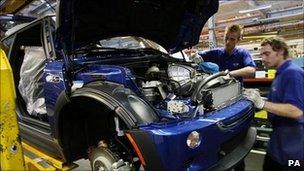Market turmoil: UK is no port in the storm
- Published
- comments
I guess it depends on your definition of safe haven. Investors are buying UK government debt these days, not dumping it. The chancellor says that is the reward for his commitment to bring down the deficit.
Perhaps. But when the FTSE has fallen nearly 20% in one month, talk of the UK being a "safe haven" starts to wear a little thin. For a time, this morning, the FTSE 100 had dipped below 5,000. That's a line it hasn't crossed since July 2010.
The yield on 10-year government debt is now less than 2.8%. A month ago it was 3.2%. George Osborne is right that this fall partly reflects a "flight to safety". If the budget deficit were still in double digits and seemed destined to stay there, investors might well be less keen to park their money in UK gilts.

Today's manufacturing output figures were worse than expected
Mr Osborne is also right to say that we benefit from this fall in rates. If it lowers the cost of borrowing for everybody, the fall in the gilt yield will operate much like an extra burst of quantitative easing (QE). Other things equal, it will support the recovery.
But - in case anyone needed any reminding - there are other things going on here. And I'm not just talking about the looters. It's not always good news when bond yields go down. In fact, when they fall as low as they have in the past few weeks, it's very bad news indeed.
British 10-year yields have not been at this level since 1946, and have not been below 3% for any sustained period of time since the 1930s. US bond yields have not been this low since the darkest days of the financial crisis, at the end of 2008.
In normal times, for most countries, the key factors determining the level of bond yields are not the government's budget plans, but investors' forecasts for future growth and inflation. If rates fall, that is usually because investors expect one or both of those things to be lower than previously thought. In our case, it's probably both.
If you want an example - take Australia. Its government, with an AAA rating, is currently paying more than 4.5%. That is not because anyone is worried about its stock of debt - now around 25% of GDP. It's because the economy's expected to grow by 4.5% next year. Countries with robust recoveries need robust interest rates to match.
By contrast, Japanese government bond yields are barely 1%, despite having a mountain of government debt worth well over 200%. It doesn't have to pay much to borrow, because its economy can't grow very much at all. In that sense, Japan has been been a safe haven since the 1990s.
Investor panic
It is declining growth prospects that have helped to drive down bond yields across large parts of the developed world in the past few weeks - at least those parts of the developed world that are not being punished for joining the euro.
But yields are also falling because investors are panicking. That's another reason why a lower bond yield is not always good news - even if the chancellor has gotten us into the habit of thinking otherwise. And that is another reason why bond yields have fallen in the US, despite Standard and Poor's saying that the American government was no longer AAA.
As I previously suggested, (see blogs of , external and 2 August), that downgrade has not materially affected the price of US Treasuries, because investors literally have nowhere else to go. If anything, S&P has merely concentrated people's minds on the lack of safe alternatives, and accelerated the stampede for safety.
In the long-term, it's the likes of France and the UK that have most to fear from the downgrade of the US. Perhaps the risk of a sovereign default in those two AAA countries is now smaller than for the US. Their parliaments are certainly more reliable. But it's interesting to note that America can still borrow more cheaply than either of them. The world seems to be re-arranging itself around America's slightly diminished creditworthiness, not the other way around.
Today, economists at Citi have put out a note asking whether the US downgrade had put the UK''s AAA rating at risk. They conclude that the AAA is probably safe for the time being, though there are reasons to be concerned over the medium term. Many would say that France, with its higher and younger debt stock, and uncertain deficit plans, probably has more to worry about right now.
But be in no doubt - our economy is deeply vulnerable to all of the events of the past few weeks. And it's not just the fall in the stock market that is telling us that. You can also look at today's disappointing industrial production numbers, which showed manufacturing output falling by 0.4% in June.
True, the royal wedding has messed things up a bit, but output has now been flat for the first six months of 2011. This is the part of the economy, remember, that was previously doing well. The June trade figures suggest the export recovery is weakening as well: the volume of goods exported (excluding the most erratic items) was 2.5% lower than a year ago, and 4.4% down on the month.
The lesson of today's data is that the recovery was not doing very well, even before £210bn got wiped off Britain's equities in the space of a week.
Apparently, the chancellor is seeking to use the crisis as a political opportunity to speed up his efforts to "revitalise Britain's sluggish economy", as the FT puts it. We should all be very glad to hear it. As Mr Osborne understands very well, when it comes to the global recovery, we are not a safe haven and we never will be.